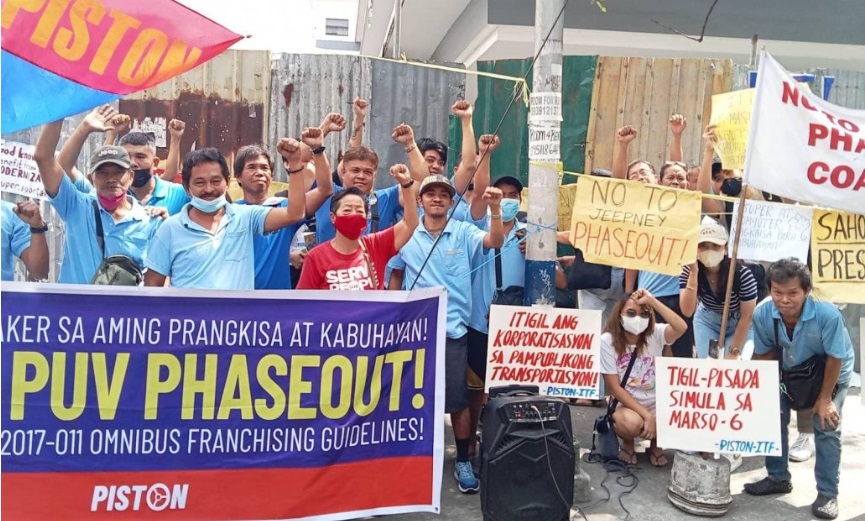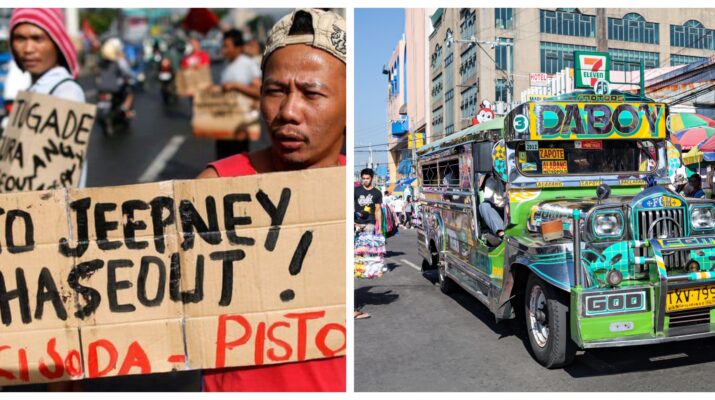As the end of 2023 approaches, the deadline for jeepney drivers to consolidate themselves into a cooperative also looms.
President Bongbong Marcos Jr. has set December 31 as the final deadline for public utility vehicle (PUV) operators to join a cooperative or else have their license to operate revoked. This is part of the government’s plan to “modernize” public transport in the Philippines, phasing out jeepney and bus units which are at least fifteen years old.
The plan was hatched way back in 2017, under Marcos’ predecessor – former President Rodrigo Duterte. However, the program stalled under the Duterte regime for the same reasons it remains controversial under this current administration.

Under the modernization program, jeepney units must be environment-friendly – requiring at least a Euro 4-compliant engine or being fully electric to minimize carbon emissions. There are also requirements to provide basic safety features such as CCTV cameras and speed limiters, while also assuring a level of comfort for passengers with an automated fare collection system and even making Wi-Fi available on board.
Modern jeepney prototypes cost between Php1.3 to 3 million per unit, but under the terms of the government’s loan scheme to assist jeepney drivers to procure modern units – at a six per cent per annum interest rate and a 7 year payment period – even the cheapest units will cost approximately Php2.1 million each.
This is by no means a paltry amount for jeepney drivers who collect fares of Php13 per person in Metro Manila and even lower in the provinces. Senator Grace Poe said in 2017 that the average jeepney driver earns a measly Php800 per day, and that was years before the Covid-19 pandemic and the War in Ukraine instigated a cost of living crisis worldwide.
Even assuming that the Php800 a day, per jeepney driver income estimate remains accurate today this will make repayments on loans in the millions of pesos financially implausible. The government has also offered equity subsidies of up to Php280,000 per unit, but this is a derisory amount considering the total cost of the modern jeepney units.

Putting the cost of modernizing jeepney units aside, the PUV Modernization Program is also problematic because it not only aims to phaseout the jeepney itself, but also how jeepney drivers operate and the routes they ply on.
As mentioned above, jeepney drivers will have to consolidate and be members of cooperatives to continue operating. This effectively phases-out individual ownership of jeepneys, a big blow to jeepney owner-operators who forked out large sums to procure their jeepney units which is their only source of livelihood.
The equity subsidies mentioned previously are meant to compensate the owner-operators for their individual units, but the total subsidy amount still pales significantly in comparison to the cost of the modern jeepneys.
Forcing jeepney drivers to be members of cooperatives is also a violation of their right to free association, as guaranteed by the Philippine Constitution. Even before the deadline for consolidation, there are already many jeepney drivers who are leaving the cooperatives they joined after citing problems like abusive management within the coop and high membership fees.
The drive to force jeepney drivers to join cooperatives is also puzzling as, if the goal truly was to modernize the jeepney fleet plying our streets, this can still be done if individual franchises are retained as is. It raises suspicions, therefore, that this radical change to the ownership model of public utility jeepneys is a covert first step to fully corporatize the transport sector in the Philippines.
By consolidating these jeepney operators into larger cooperatives, it becomes easier for large corporations to swoop in and buy out these jeepney cooperatives rather than if they remained fragmented as individual franchisees. It could spark the beginning of large corporate jeepney operators that would raise the basic fare in order to extract a profit.

While December 31 is merely the deadline for consolidation of jeepney drivers, rather than the deadline for modernization, even this early on we can already tell that this program to phaseout older jeepney models will benefit corporations – particularly foreign ones – the most.
Due to a chronic lack of industry in the Philippines, the modern jeepney stocks will be purchased from foreign companies like Isuzo, Toyota, and Hino. The Euro IV engines will be sourced from India, China and Japan; one of the biggest companies specializing in e-jeepneys is a Taiwanese company as well.
Costs incurred will inevitably be passed on to Filipino commuters, who are already bearing the brunt of the cost of living crisis with soaring price of basic food items and fuel. Any dramatic increases to transport fares will further add to their misery; and this scenario becomes even more likely if the jeepney cooperatives will be bought-out by corporate entities further down the line.
Not only is the program to phaseout jeepneys unfair to jeepney drivers, they are unfair to the Filipino people as a whole. Filipino jeepney drivers risk losing their livelihoods, Filipino commuters will be hit with higher fares, meanwhile foreign companies will make a fortune selling the modern jeepney units to us.
Much has been said about the PUV Phaseout Program being anti-poor, we need to acknowledge that it is anti-Filipino as well.

